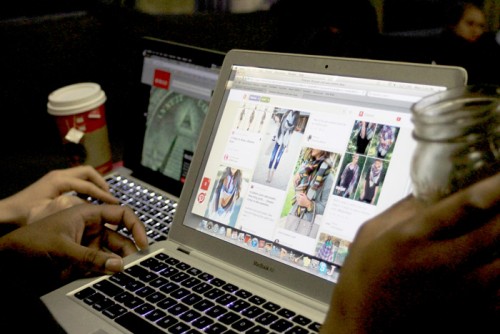The McGill University Senate, a governing body that supervises all academic matters on campus, convened on Feb. 21 to discuss the implementation of interactive learning methods in classrooms. Deputy Provost Student Life and Learning Ollivier Dyens (DPSLL) also delivered a report about progress made by the office of Student Life and Learning (SLL) in 2016-2017.
Engaged Classroom in a Digital World
During the meeting, a guest panel discussed how the presence of devices such as laptops and cellphones has changed the social and educational dynamics of lectures. The panel, composed of two professors and one student, was invited to speak about their experiences with interactive learning strategies and technologies such as polling software and group work.
The first panelist, Assistant Professor Sharmistha Bhadra, Faculty of Engineering, complained that students are easily distracted by their electronic devices during lectures.
“[In a lecture] I’m the only one talking, but most of the students are not engaging,” Bhadra said. “They are looking at their cell phones or their computers […or have] just stopped showing up to classes. It was very discouraging because I felt like I wasn’t doing a good job. When it came to the final, [those] who didn’t show up to class or engage in class did terribly.”
Bhadra suggested professors use active learning techniques such as group activities to increase student engagement.
“I tried to rely more on the black boards to solve problems [collectively] and [was able to] incorporate more student input,” Bhadra said.
Kenneth Ragan, Professor in the Faculty of Science and the second panelist, shared his experiences leading two freshmen physics lectures with up to 700 students in attendance. In order to boost class participation, he said he implemented polling technology and allotted time during lessons for students to discuss course material. He emphasized the effectiveness of the latter method in particular.
“Interaction between students is at least as important as interaction with the professor,” Ragan said. “Peer instruction happens when you have a group of students whose knowledge individually is very incomplete but are able to bounce ideas off of each other and effectively find a solution.”
The last panelist, Salma Youssef, U3 Biochemistry, presented a collection of student testimonies on classroom engagement and interactive learning strategies. Many students endorsed activities like classroom simulations and small-group discussions—the latter of which Youssef corroborated.
“In my personal experience, I found that in courses like chemistry, when professors pause and allow the students to think through the material, and then prompt one of the students to answer, made learning a lot more effective,” Youssef said.
Dyens presents Annual Report from Student Life and Learning (2016-17)
Dyens presented the Annual Report, which highlights achievements by Student Life and Learning, an administrative office which aims to foster students’ academic development and well-being through a number of services including Student Housing and Hospitality Services and Athletics and Recreation.
In the past year, SLL received $8 million in provincial grants to implement more experiential learning initiatives. The funding was divided between a number of programs for both undergraduate and graduate students.
“$1.5 million was allocated to Enriched Educational Opportunities (EEO), so all faculties can provide more bursary for work experience opportunities outside the classroom,” Dyens said. “Graduate and Postdoctoral Studies also received $1.5 million to implement more PhD internships.”
Dyens also outlined ways to improve SLL’s performance after his departure from his office this Summer.
“In the next year, we need to focus a bit more on the customer service aspect to respond to student needs more quickly,” Dyens said. “This will also include the Mental Health and Wellness Strategy, which will come out soon. It’s really the customer service aspect that make the biggest difference for how the students feel about the SLL.”
The Senate will reconvene on March 28.








